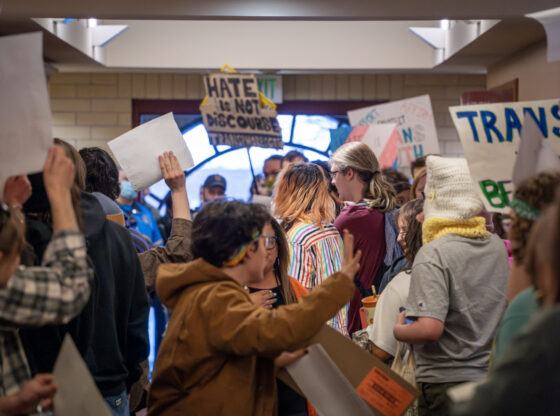On Sept. 27, disgraced R&B singer R. Kelly was found guilty on charges of sex trafficking, bribery, racketerring and sexual exploitation of a child. He is facing a possible 10 years to life in prison.
It took 25 years for prosecutors to put the superstar behind bars after numerous victims came forward. Kelly is another example of how the U.S. Justice System allows famous perpetrators to walk freely when there is more than enough evidence to put them behind bars. Out of the 14 underlying acts associated with the racketeering charge, the jury found that the government proved 12 of the acts. They involved the late singer Aaliyah, Stephanie, Jerhonda Pace, Jane and Faith—most of these victims chose to go by their first name or pseudonyms.
Kelly’s first allegation of having sex with minors was printed by Chicago Sun-Times on Dec. 21, 2000. Reporters Jim DeRogatis and Abdon M. Pallasch publish a story alleging that Kelly used his fame to meet young girls and then coerce them into having sex with him. However, it all started before that, when he married Aaliyah Haughton—famous R&B singer and also known as Aaliyah or “The Princess of R&B—in 1994, when she was only 15-years-old and he was 27.
In 2019, more accusers stepped up to tell their appalling experiences with Kelly. Jan. 3, 2019, was when the first episode of the documentary “Surviving R. Kelly” aired. The docu-series revealed young women who were emerging and uniting their voices against singer R. Kelly. In the documentary, there were detailed new allegations about his physical, mental and sexual abuse with more than 50 interviews not only from accusers, but high profile figures. This alone made prosecutors take another look at all the allegations.
The docu-series showed a trend in his victims—young women and girls looking to start their music career. However, after getting involved with Kelly, many of these women and girls became unreachable for their families. The parents of Jocelyn Savage described their daughter as “brainwashed” by Kelly.
The project transformed the public’s opinion swiftly about the artist, even as he denies these allegations. It aired during a crucial moment. Executive producer, Dream Hampton, mentioned that with social media spreading the word quickly, a younger generation was less tolerant and viewers were drawn in by the power of seeing a succession of survivors telling their stories directly to the camera.
After the documentary aired Kelly had an interview with Gayle King on CBS. Following this, a CBS Morning interview was held with Kelly’s victims, stating how they reacted to his explosive interview with King on Mar. 9, 2019. Michelle Kramer believed that her daughter Dominique Kramer was abused by Kelly for “nearly a decade.” She continued to describe that Dominique almost threw the remote at the TV because him standing up reminded her of the rage.
“When she didn’t do what he asked or that he didn’t like… there were punishments” says Kramer. In the documentary, we see the heartbreaking rescue Kramer goes through to find and help her daughter escape.
The verdict alone is a long overdue step to justice for those who have been calling out the sexual predator.
Within this off-putting story, it highlights the music industry’s current crisis of culture. The industry has historically been a space where social norms are flaunted, disregarded or even subverted, especially shown when sex and drugs are involved. The bigger the talent an artist or executive has, the wider the allowances are for behavior that a normal civilian couldn’t get away with.
Lately, there has been a thing where people “separate the art from the artist” as Billboard notes. This can be seen where famous figures like MGK and Jerry Lee Lewis, and are still praised for their work, and individuals disregarding the accusations made. While the #MeToo movement—a social movement against sexual harassment and abuse—has caused changes from politics to Hollywood, the music industry remains untouched.
Particularly with Black music, there is still a strong resistance to speaking out against or abandoning established figures, regardless of the accusations. In his previous trials, Kelly still had fans surrounding him, supporting that the things he was accused of were false. The Boondocks episode “The Trial of R. Kelly” mimics the real events that took place in 2005.
Chance the Rapper, like many individuals, did not believe the accusations against Kelly. “I didn’t value the accusers’ stories because they were Black women,” he said.
More often than not, the value and the voices of Black women and girls is dismissed and overlooked. However, this needs to change because their stories hold just as much weight as their white counterparts. Black girls are perceived to be as more knowledgeable and experienced on adult topics, such as sex, and less deserving of care and protection from abuse. Before the age of 18, one in four black girls will be sexually abused. In turn, they are blamed and not supported for the tragedy that happened to them. The justice system does not protect Black bodies, especially those of Black and Brown women. It forces them into silence not only for the lack of support, but the lack of transformative justice.
The fight for justice is not over yet. Kelly has a sentencing in New York scheduled for May 4, 2022. Until then, he will remain in custody. While this case is just a start, holding famous and idolized figures accountable and not excusing repulsive behaviors and actions is the start to creating a new social norm. With the current generation and social media, that should not be a problem.











